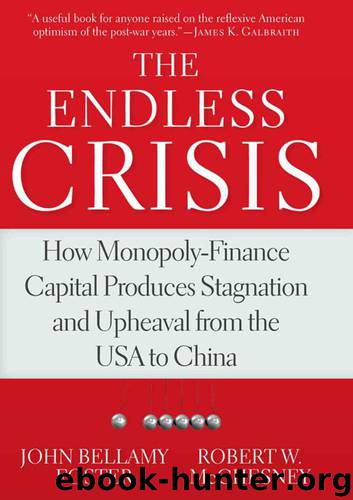The Endless Crisis: How Monopoly-Finance Capital Produces Stagnation and Upheaval from the USA to China by Foster John Bellamy & McChesney Robert W. W

Author:Foster, John Bellamy & McChesney, Robert W. W. [Foster, John Bellamy]
Language: eng
Format: epub
Publisher: NYU Press
Published: 2012-08-31T21:00:00+00:00
This means that outsourcing production through foreign affiliates and subcontractors in the lower-wage sectors of the world economy is requisite in international oligopolistic rivalry. A “new nomadism” has emerged within production, with locational decisions determined largely by where labor is cheapest, and with imperial corporations pulling up stakes and moving elsewhere at the first signs of labor resistance.50
For today’s oligopolistic multinationals, global expansion is understood to be an imperative for accumulation, and hence survival. If one major corporation moves into a new market, its rivals have to follow quickly or risk being shut out. Some economic theorists such as Graham and Krugman call this the “‘follow the leader’ pattern” of multinational corporate investment.51
Trade itself is no longer to be seen realistically as resulting primarily from free market forces—as in neoliberal theory—but as more and more the product of the interactions between the parent companies of multinationals and their affiliates, and therefore increasingly taking the form of intrafirm trade. In the United States, trade is completely dominated by multinationals. As John Dunning and Sarianna Lundan observe in International Enterprises and the Global Economy (2008): “Combining the share of US MNE parents and that of foreign affiliates in the US, MNEs accounted for 77 percent of US exports and 65 percent of imports in 2002.”52 Hence, where U.S. international trade is concerned, it is fast approaching the situation where multinational corporations are the only actors.53 “Transnationalisation,” Cowling wrote in 2005, referring to the global growth of multinational or transnational corporations, “introduced an added dimension of control over the market—it brings control by giant firms to the pattern and dimensions of trade and therefore undermines the possible impact of trade in restraining monopoly or oligopoly pricing behaviour within national markets.”54
Download
This site does not store any files on its server. We only index and link to content provided by other sites. Please contact the content providers to delete copyright contents if any and email us, we'll remove relevant links or contents immediately.
International Integration of the Brazilian Economy by Elias C. Grivoyannis(110543)
The Radium Girls by Kate Moore(12018)
Turbulence by E. J. Noyes(8040)
Nudge - Improving Decisions about Health, Wealth, and Happiness by Thaler Sunstein(7693)
The Black Swan by Nassim Nicholas Taleb(7110)
Rich Dad Poor Dad by Robert T. Kiyosaki(6613)
Pioneering Portfolio Management by David F. Swensen(6289)
Man-made Catastrophes and Risk Information Concealment by Dmitry Chernov & Didier Sornette(6007)
Zero to One by Peter Thiel(5789)
Secrecy World by Jake Bernstein(4742)
Millionaire: The Philanderer, Gambler, and Duelist Who Invented Modern Finance by Janet Gleeson(4469)
The Age of Surveillance Capitalism by Shoshana Zuboff(4279)
Skin in the Game by Nassim Nicholas Taleb(4239)
The Money Culture by Michael Lewis(4198)
Bullshit Jobs by David Graeber(4179)
Skin in the Game: Hidden Asymmetries in Daily Life by Nassim Nicholas Taleb(3992)
The Dhandho Investor by Mohnish Pabrai(3760)
The Wisdom of Finance by Mihir Desai(3735)
Blockchain Basics by Daniel Drescher(3574)
